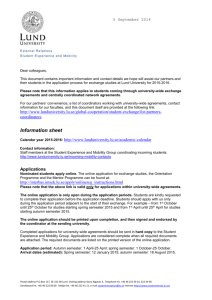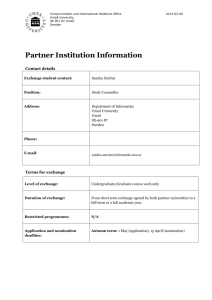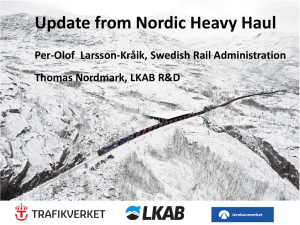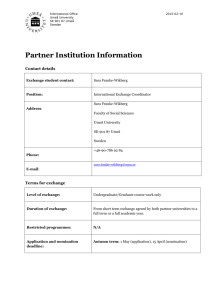Working in Sweden - Sistema Piemonte
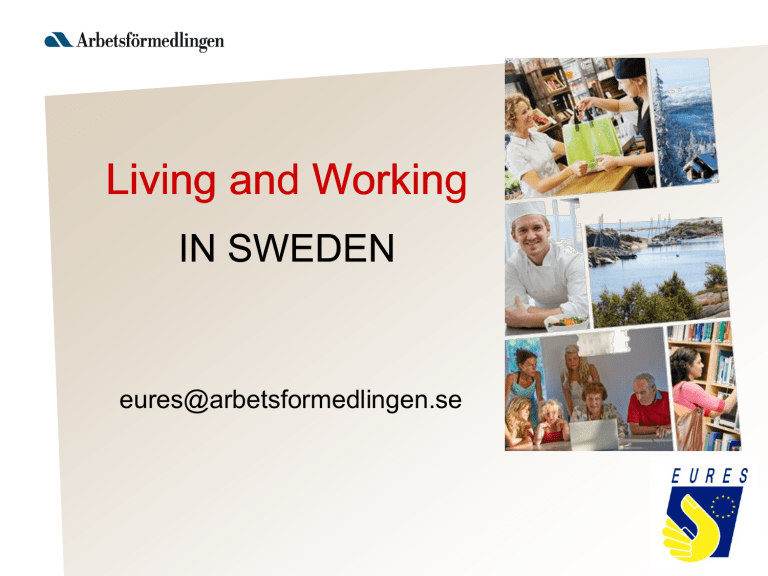
eures@arbetsformedlingen.se
Facts about Sweden
• Sweden is the third largest country in EU
• 9.6 million inhabitants, only 21 people/km2
• 85% live in the south
• Currency:
Svenska kronor (Swedish Crown)
SEK 100 = EUR 11.38
• EU-member state since 1995
Our dear neighbours!
Göteborg
Malmö
Kiruna
Umeå
Stockholm
Famous Swedes
- Alfred Nobel - Nobel prize
- Zlatan Ibrahimovic – football
- Astrid Lindgren – Pippi books
- Stieg Larsson – Millenium books
- Ingmar Bergman – film director
Alexander Skarsgård – True Blood
- ABBA, Swedish House Mafia
- IKEA, H&M
- VOLVO
Language skills
• Most jobs require good level of Swedish
• In some highly skilled jobs you can get by using
English only. (Still expected that you learn Swedish)
• Few jobs for low skilled workers with no Swedish.
www.si.se
Labour Market Statistics
Unemployment rate
• General 7.5 %
Engineering and IT shortages
- Power Systems Engineers
- Electrical Engineers
- Automation Engineers
- Mechanical Engineers
- Software Developer
- System Developer
- IT Architects
- Software Test Engineer
- Mining and Metallurgy Engineers
- HVAC Engineers
- Civil Engineers
Other shortages
• Physicians
• Surgical Nurses
• Nurses, psychiatric care
• Nurses in emergency care
• Geriatric Nurses
• Chefs
• Preschool teachers
• Car Mechanics, heavy vehicles
Working in Sweden
• Full time, 40 hours per week
• 25 days vacation per year
• No national minimum wage
• Collective agreements between trade unions and employers
Engineers working in Sweden
Median monthly salaries, gross
• Bachelor of Science in Engineering
Starting: 26,000 SEK
10 years experience: 37,200 SEK
• Master of Science in Engineering
Starting salary: 28,500 SEK
10 years experience: 42,600 SEK
Figures from: www.sverigesingenjorer.se
Working in Sweden
• All EU/EEA or Swiss citizens have the right to work in Sweden
• After 3 months – register with the Swedish
Migration Board
• Citizens of a non-EU country - need a work permit
• www.migrationsverket.se
Recognition of foreign diplomas
• Regulated professions – NARIC
• Universitets- och Högskolerådet
The Swedish Higher
Education Authority www.uhr.se
Finding a job
• Public Employment Services www.arbetsformedlingen.se
Many links to other major job websites
• EURES http://www.eures.europa.eu/
• Swedish newspapers www.onlinenewspapers.com/sweden.htm
•Jobs in English www.jobsinstockholm.com
www.thelocal.se/jobs
Applying for a job in Sweden
• Applying via web site, online or e-mail
• Applications should be typewritten in Swedish or English.
• An application consists of:
Cover letter (1 page)
CV (1-2 pages)
Cover Letter
• Should be a ”bridge” that shows employer how your CV meets his or her vacancy ad’s requirements
• Don’t repeat information that’s in your CV - explain what you’ve learned, what you can offer them, give an example showing how you work or deal with customers
Cover Letter
• The first paragraph of your letter should include information on why you are writing. Mention the position you are applying for and where you found the job listing.
Include the name of a mutual contact, if you have one.
• Middle Paragraph(s); The next section should describe what you have to offer the employer. Mention specifically how your qualifications match the job you are applying for.
Remember, you are interpreting your resume, not repeating it.
• Conclude your cover letter by thanking the employer for considering you for the position. Include information on how you will follow-up.
Letters of Interest
- also known as prospecting letters should contain information on:
• why the company interests you;
• why your skills and experience would be an asset to the company;
• also provide information on how you can be contacted if the company is interested in following up with you.
CV
• Simple, attractive layout — think about how it looks!
• You can start with either your education or work experience
• Reverse time order — the latest is first
• We write dates: 14-02-13
• Don ’ t go back too far in time (except certain education)
• Skip short courses, apprenticeships if they ’ re not relevant
After sending the application…
• Positive with telephone contact (if given in ad)
• Have some intelligent questions ;-)
• An extra chance to market yourself and stand out!
Job interview
• Be on time!!!
• Dress accordingly?
• Be prepared
3 most common interview questions:
- Please tell us a little bit about yourself.
- Tell us about your strengths and limitations.
- Where do you see yourself in five years?
www.arbetsformedlingen.se
Swedish work place culture
• Flat organisations
• Team work and consensus
• ”Du” – first name basis – informality!
• Gender equality
• Strong trade unions
Income Tax
• Municipal tax between 29-35 %, depending on where you live
• Most people pay only municipal tax
• State tax is paid on taxable incomes above 413,200 SEK – 20% above 591,600 SEK – 25 % www.skatteverket.se
(2013)
Social Insurance
• Sickness
• Parental leave
• Dental care www.forsakringskassan.se
• Pensions www.pensionsmyndigheten.se
Unemployment insurance
• Is not a part of the Social Insurance scheme
• Basic insurance:
No membership requirement, max 320 SEK/day
• Voluntary insurance:
For members of an unemployment insurance fund, max 680 SEK/day
• 300 days, 5 days per week. Tax will be deducted.
www.iaf.se
Housing
• Rent an apartment or house
(cooker, fridge and freezer included)
• 1 bedroom apartment, average rent
4,595 SEK/month, 68 m 2
(heating included)
• Buy into a housing co-op
• Buy a house
• Accommodation costs vary greatly
Sweden and Swedes
• Coffee and coffee breaks
• Tend to avoid conflict
• Shoes off indoors (in people’s homes)
• Light summer nights and dark winters
Tack! Thank you!
EURES Sweden eures.se



